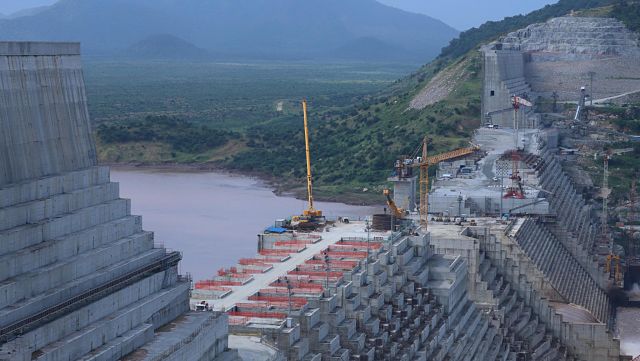 Ethiopia’s Grand Renaissance Dam (Photo: REUTERS/TIKSA NEGERI)
Ethiopia’s Grand Renaissance Dam (Photo: REUTERS/TIKSA NEGERI)
Quartz Africa
By Mahemud Tekuya (JSD/Ph.D candidate, University of the Pacific)

Published on March 28th, 2020
Disputes over the filling and operation of Ethiopia’s Grand Ethiopian Renaissance Dam have, once again, threatened security in North-East Africa.
The dam—a huge project on one of the River Nile’s main tributaries, the Blue Nile in Ethiopia—is designed to generate 6,000 megawatts of electricity. Its reservoir can hold more than 70 billion cubic meters of water. That’s nearly equal to half of the Nile’s annual flow. Filling the immense reservoir will diminish the flow of the Nile.
Tensions have been particularly acute between Egypt and Ethiopia because more than 80% of the water reaching Egypt comes from the Blue Nile.
During the Scramble for Africa, controlling the source of the Nile was a major colonial goal for the British.
Ethiopia is planning to start filling the reservoir in the coming wet season, July 2020. Since November 2019, Ethiopia, Sudan, and Egypt have held dozens of trilateral talks – on the filling of the reservoir and operation of the dam – which were supported and attended by the US and the World Bank as “observers.” In the latest round of talks, Ethiopia pulled out of the meeting. Diplomatic spats between Addis Ababa and Cairo are not new. Since the early 1990s, the two countries have held various talks on the Nile but these usually end in a stalemate and the threat of military recourse by Egypt.
Why? Because of the Nile Water Treaties.
During the Scramble for Africa, controlling the source of the Nile was a major colonial goal for the British. Various agreements—including the Nile Treaties – where established to do this.
The Nile Water Treaties were agreements between the British (on behalf of its colonies, Sudan, Kenyan, Tanzania and Uganda) and Egypt. They effectively prevent upstream countries from using the Nile’s water without the consent of those downstream. This resulted in a strong Egyptian bias and Egypt continues to try to enforce the treaties today.
Things need to change so that the Nile can benefit all in the region. For instance, Ethiopia has not been able to use the Nile and has relied on rain-fed agriculture which leaves millions of Ethiopians vulnerable to hunger.
Based on my research which looks into how the status quo can be changed, I believe that getting rid of the Nile Water Treaties is necessary to resolve the disputes over the Nile’s waters and find an amicable way forward in the dam negotiations.
—
Related:
The United States Must Not Pick Sides in the Nile River Dispute: BY ADDISU LASHITEW
Ethiopia Won’t be Forced by US on Dam, Foreign Minister Says (The Associated Press)
Ethiopia says Trump got inaccurate information on Nile dam (AP)
Nile Dam: Ethiopia Calls US View “Totally Unacceptable (BBC)
Ethiopia Skips Nile Talks in DC (AP)
Ethiopia asks U.S. to postpone final talks on Blue Nile dam (Reuters)
Why Ethiopia, Egypt, and Sudan should ditch a rushed, Washington-brokered Nile Treaty (Brookings)
Ethiopia says US plans ‘substantial financial support’ (AP)
U.S. to offer financial support for Ethiopia political reforms -PM (Reuters)
Join the conversation on Twitter and Facebook.

























